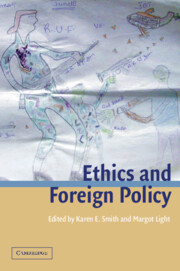Book contents
- Frontmatter
- Contents
- Notes on contributors
- 1 Introduction
- Part I Theories
- Part II Instruments and policies
- Part III Case studies
- 9 The United States and the ethics of post-modern war
- 10 Blair's Britain: a force for good in the world?
- 11 The EU, human rights and relations with third countries: ‘foreign policy’ with an ethical dimension?
- References
- Index
9 - The United States and the ethics of post-modern war
Published online by Cambridge University Press: 22 September 2009
- Frontmatter
- Contents
- Notes on contributors
- 1 Introduction
- Part I Theories
- Part II Instruments and policies
- Part III Case studies
- 9 The United States and the ethics of post-modern war
- 10 Blair's Britain: a force for good in the world?
- 11 The EU, human rights and relations with third countries: ‘foreign policy’ with an ethical dimension?
- References
- Index
Summary
In general the period since 1989 can be said to have been a period of progress for US foreign policy. It began with the collapse of communism and the fall of the Berlin Wall, and continued into the Gulf War and the conflict in Kosovo. It was not without setbacks, of course: the ill-fated UN intervention in Somalia, and the years it took to reach the Dayton Accord during which 250,000 people lost their lives. A New World Order was not born. The world may be safer for democracy than at any time in the twentieth century, but many democratic regimes, including Russia, have not fared well and at the very beginning of the period – in Tiananmen Square – the democratic movement in China was brutally suppressed.
Still, the United States has been at the centre of the management of the international order since the Cold War ended. It led the coalition that evicted Iraq from Kuwait. The war against Serbia was largely American led and conducted. And it has played the dominant role in trying to prevent nuclear proliferation.
The collapse of communism made possible a brief moment of euphoria between 1991 and 1994 when it seemed possible for the United States to restructure the world on new foundations. The idea of a world order based not on power but on international law flourished.
- Type
- Chapter
- Information
- Ethics and Foreign Policy , pp. 147 - 166Publisher: Cambridge University PressPrint publication year: 2001
- 2
- Cited by



